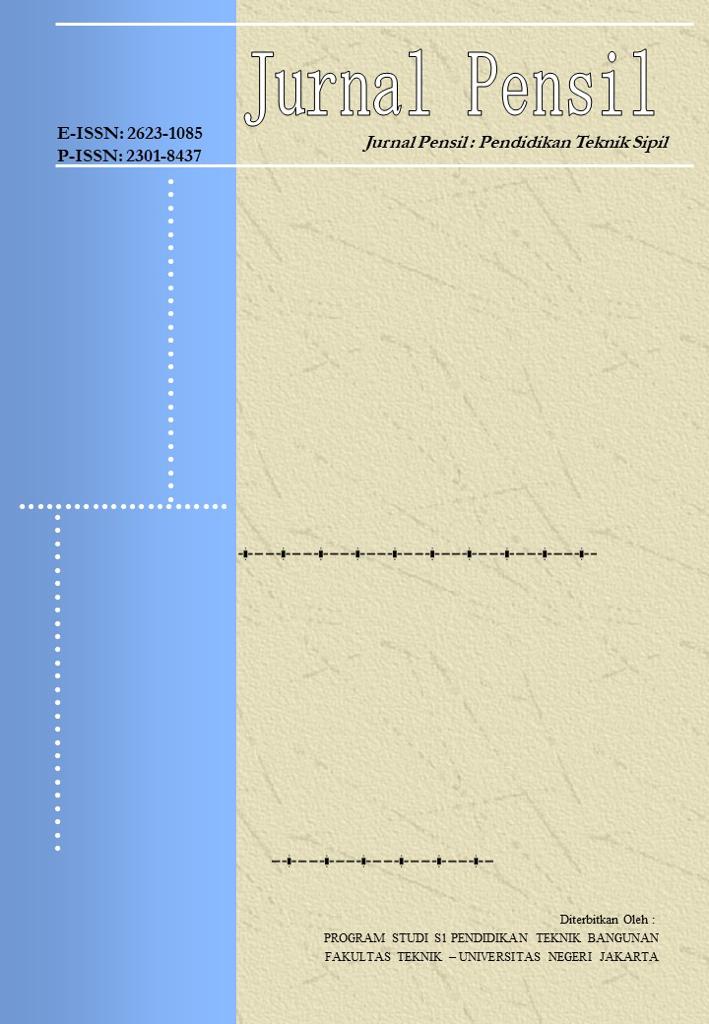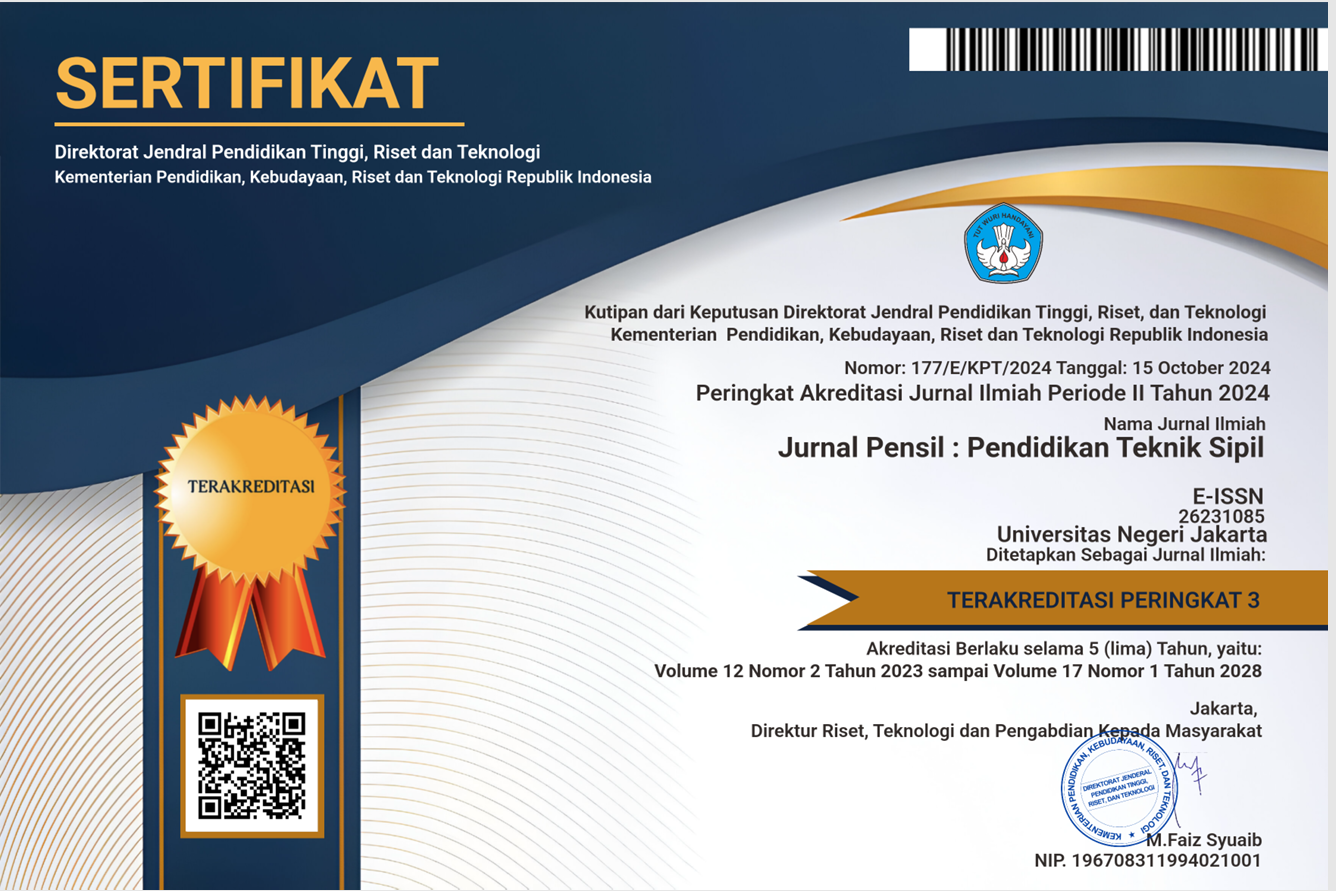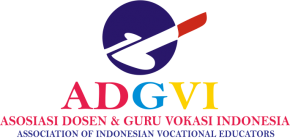ARE VOCATIONAL SCHOOL STUDENTS READY TO FACE WORKFORCE DISRUPTION IN THE CONSTRUCTION FIELD?
DOI:
https://doi.org/10.21009/jpensil.v13i2.44379Keywords:
Digital Learning, Disruption Technology, Construction Field, Work Readiness, Vocational High SchoolAbstract
The purpose of this research is to 1) Describe the digital literacy understanding of vocational high school students in the Construction and Property Engineering program. 2) Analyze students' understanding of technological disruption in the field of construction. 3) Analyze students' readiness to face technological disruptions in the construction field. The research was conducted at a vocational high school that offers the Construction and Property Engineering program in South Sulawesi province. The study took place from March to June 2023. The population of the research consisted of all students in grade X, totaling 1125 students. The sample size was determined using the Slovin formula with a 0.05 level of error, resulting in a sample of 318 respondents. All items are valid and reliable based on the validity and reliability test with a value greater than 0.361. The research findings indicate that the digital literacy understanding of vocational high school students in the Construction and Property Engineering program regarding their readiness to face the labor workforce disruption in the construction field is mostly categorized as very good with a percentage of 80%. Furthermore, students' understanding of technological disruption in the construction field and their readiness to face the labor workforce disruption in the construction field is dominantly categorized as very good with a percentage of 63%. Student readiness is dominantly in the Able category, but there are still 18% who are in the Need to optimize category in facing technological disruption in the construction sector.
References
Aditya, B. R., Ismiatun, A. N., Atika, A. R., & Permadi, A. (2022). Digital childhood education : qualitative Digital disruption disruption in in early early childhood education : A A qualitative research from from t t eachers ’ eachers ’ perspective perspective. Procedia Computer Science, 197(2021), 521–528. https://doi.org/10.1016/j.procs.2021.12.169
Alfa, A. (2018). Industri Konstruksi Di Era Industri 4.0. Selodang Mayang: Jurnal Ilmiah Badan Perencanaan Pembangunan Daerah Kabupaten Indragiri Hilir, 4(3).
Arfandi, A., & Sampebua, O. (2016). Kesiapan Pelaksanaan Praktik Kerja Industri Program Studi Keahlian Teknik Bangunan di Kota Makassar. Jurnal Cakrawala Pendidikan, 1(1).
Asrib, A. R., & Arfandi, A. (2020). Adaptasi perubahan spektrum SMK 2016 oleh guru SMK Program Keahlian Teknik Konstruksi dan Properti. DEDIKASI, 22(1). https://doi.org/10.26858/dedikasi.v22i1.13827
Baiti, A. A., & Munadi, S. (2014). Pengaruh Pengalaman Praktik, Prestasi Belajar Dasar Kejuruan dan Dukungan Orang Tua Terhadap Kesiapan Kerja Siswa SMK. Jurnal Pendidikan Vokasi, 4(2).
Clarke, L., & Winch, C. (2007). Vocational education: International approaches, developments and systems. Routledge.
Djohar, A. (2007). Pendidikan teknologi dan kejuruan. Dalam Ilmu Dan Aplikasi Pendidikan. Bandung: Pedagogiana Press. Hal, 1285, 1300.
Fitriyanto, A. (2006). Ketidakpastian memasuki dunia kerja karena pendidikan. Jakarta: Dineka Cipta.
Gunawan, I., & Mudayana, A. A. (2016). Hubungan antara Pengetahuan, Sikap dan Motivasi dengan Perilaku Penggunaan Alat Pelindung Diri pada Pekerja Bagian Produksi PT. Katingan Indah Utama, Kabupaten Kotawaringin Timur, Provinsi Kalimantan Tengah. Unnes Journal of Public Health, 5(4), 336–347.
Herlambang, D. S., Murtinugraha, R. E., & Bachtiar, G. (2013). Kesesuaian Kurikulum Program Studi Pendidikan Teknik Bangunan Universitas Negeri Jakarta Dilihat dari Kompetensi Kerja Berdasarkan Standar Kompetensi Kerja Nasional Indonesia (SKKNI) Sektor Jasa Konstruksi. Jurnal Pensil: Pendidikan Teknik Sipil, 2(2), 73–77.
Horne, R. (2023). 2 Employment and social trends by region. World Employment and Social Outlook, 2023(1), 57–85.
Lekan, A., Aigbavboa, C., Babatunde, O., Olabosipo, F., & Christiana, A. (2022). Disruptive technological innovations in construction field and fourth industrial revolution intervention in the achievement of the sustainable development goal 9. International Journal of Construction Management, 22(14). https://doi.org/10.1080/15623599.2020.1819522
Munjiat, S. M., & Rifa, A. (2023). AL-AFKAR : Journal for Islamic Studies Pengaruh Era Disrupsi Terhadap Velue SMK TARA Depok Cirebon. 6(1), 515–524. https://doi.org/10.31943/afkarjournal.v6i1.564.
Norwich, B., Fujita, T., Adlam, A., Milton, F., & Edwards-, A. (2018). Educational Psychology in Practice theory , research and practice in educational psychology Lesson study : an inter-professional collaboration approach for Educational Psychologists to improve teaching and learning. Educational Psychology in Practice, 7363, 1–16. https://doi.org/10.1080/02667363.2018.1468733
Ramadhan, M. A., Iriani, T., & Handoyo, S. S. (2013). Relevansi Kompetensi Lulusan SMK Khususnya Kompetensi Keahlian Teknik Gambar Bangunan Dengan Kompetensi Yang Dibutuhkan di Dunia Kerja. Jurnal Pensil: Pendidikan Teknik Sipil, 2(1), 1–10.
Slamet, P. H. (2016). Konstribusi Kebijakan Peningkatan Jumlah Siswa SMK Terhadap Pembangunan Ekonomi Indonesia. Jurnal Cakrawala Pendidikan, 35(3).
Sudira, P. (2020). Paradigma Baru Pembelajaran Vokasional Era Revolusi Industri 4.0: Membangun SDM Digital Among Kreativitas Dagang Inovasi. Univeristas Negeri Yogyakarta.
Vandela, F., & Sugiarto, A. (2021). Pengaruh Penggunaan Teknologi Informasi Dan Kemampuan Berkomunikasi Interpersonal Terhadap Kinerja Karyawan. Jurnal Manajemen (Edisi Elektronik), 12(3), 429–445.











.png)
.png)
1.png)

